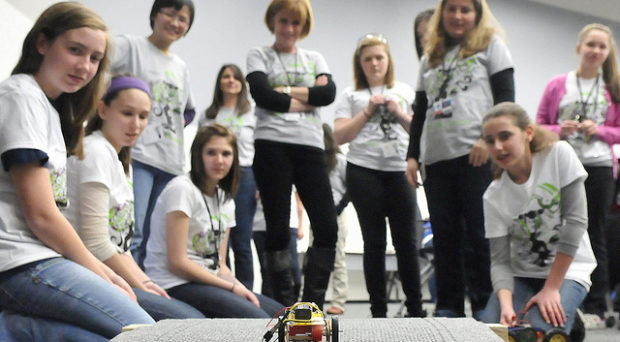
This blog originally appeared on Springer Open blog
It is clear that women continue to be underrepresented in Science, Technology, Engineering and Medicine (STEM). Women earn less than 20% of bachelor’s degrees in computer science and engineering, and constitute less than 15% of all working engineers in the USA according to the National Science Foundation, National Center for Science and Engineering Statistics. This underrepresentation is detected well before women reach the career level and may be related to interest and self-concept as well as to institutional factors.
The constructs of interest and motivation are often identified as factors that contribute to the persistence of undergraduate college women in physics, mathematics, engineering, engineering technology, and computer science.
In order to gain a deeper understanding of what experiences women credited for influencing their career interest goals and their motivation to succeed in academic courses of their chosen STEM fields we conducted a study. Data was collected using a mix of questionnaires and focus groups in order to identify contributing factors.
As part of the study we asked university students to recall and share any particular experiences that they attributed to sparking their interest in a science, technology, engineering or mathematics field.

Findings
We found that early experience or interaction with a career field leads to interest development.
Olivia: The first thing I wanted to be when I was younger was an astronaut. I’m from Galveston and they opened a new planetarium and my friends and I got to meet all these astronauts. I always really enjoyed my science classes. I don’t feel like sociology or philosophy would spark my interest. It’s like “hey, here, memorize Aristotle.” I like hands on and doing things. Science does take memorization but it’s more hands on.”
Olivia: “I always really enjoyed my science classes. I like hands on and doing things. Science does take memorization but it’s more hands on”
Students credit experiences they shared with people important to them, influence of a sibling’s participation in a science or mathematics event can be an early interest trigger.
Alicia: I have an older brother who was in a science fair and created an amusement park out of K’NEX and I thought it was so cool! The Ferris wheel moved. Also, I really loved Rollercoaster Tycoon. I spent hours designing. I knew I was an engineer right there. Playing that I knew that I was going to be an engineer.
Access to early experiences with tools can lead to the development of both interest and motivation.
Sarah: We did a lot of residential work growing up. At first I only watched and then I was allowed to wield tools. My parents remodeled the home and I was finally allowed to wield tools. It was like, “Look, I can make something out of this!”
Analysis revealed that the majority of these students readily point to early experiences of hands-on learning with building kits or with real technologies such as computers. They reveal great joy when, for example, they describe their use of “real” building tools and how this transformed how they see and think of themselves.
Many also identified an early STEM-career role model such as a family member or community hero. Some students also point to strong academic programs in their schools that welcomed girls and helped them become familiar with advanced science, technology, pre-engineering, and/or mathematics courses.
Sources of motivation for pursuing a STEM career
We asked students to discuss specific sources of motivation they attributed for their success in STEM courses and STEM career experiences. Students revealed their love for building, creativity, or problem solving. They discussed the joy and fun they attribute to doing the work of STEM academic study—the math, the coding, and the designing. Students discussed the pride they feel in being resilient as they sought to “conquer” STEM classes in order to arrive at the point where they can “do” the engineering things that make them happy.
Students discussed the pride they feel in being resilient as they sought to “conquer” STEM classes in order to arrive at the point where they can “do” the engineering things that make them happy.

Carina: I’m basically… I’m very bubbly, and very outspoken in a way. I’ve been told I am resilient, and I didn’t know what that was, so I had to look it up. I found a lot of meanings about it, one of them is actually like a, an example is pulling a spring and having it bounce back. I go oh, there goes engineering right there, that’s science. Cool, I’m relating to both I guess.
Stacey: I’m very outgoing and I love meeting new people. I love art, I love building things out of nothing, I love math- I get a math test and I get excited!

Gabriela: I like everything neat and all in its place – code is neat and perfect and all in its place so that fits well with my personality.
Overall analysis revealed that even those women who described themselves as introverts, revealed an inner independence and curiosity intrinsic to their personality that aligned to their particular personal skills (organization, problem solving, technology, etc.) and saw this as a good fit to their chosen field of study. They are motivated to pursue a STEM field because they recognize an inner satisfaction or intrinsic motivation that drives them to persist.
Comments